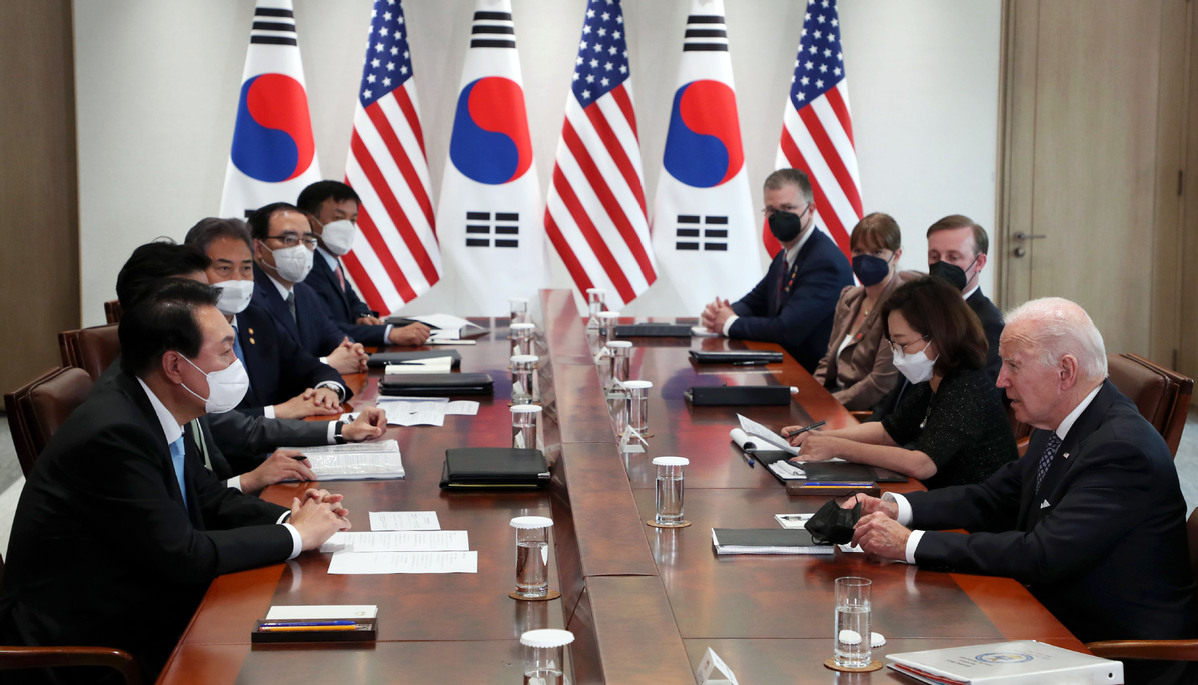
South Korean President Yoon Suk-yeol (1st L) and US President Joe Biden (1st R) hold their first summit talks in Seoul, South Korea, May 21, 2022. [Photo/Xinhua]
This is an editorial from China Daily.
That the United States president has chosen to travel to Asia, instead of Europe where the US' European allies are struggling to cope with the collateral damage of the conflict between Russia and Ukraine, reveals the importance that Asia has in Washington's strategic calculations.
As Joe Biden told ROK President Yoon Suk-yeol and Japanese Prime Minister Fumio Kishida, the US presence in and commitment to the Indo-Pacific, as Washington insists on calling it, are solid and future-oriented. And as multiple US officials have confirmed, and international observers have pointed out, Washington's every recent diplomatic maneuver in the region has a perceived threat from China behind it.
Much of the rhetoric about cementing US-ROK and US-Japan alliances, as well as the Quadrilateral Security Dialogue and the Indo-Pacific Economic Framework, which is to be unveiled on Monday, sounds targeted mostly at China.
Unfortunately, this is no longer a solo refrain by Washington. The new leaders in both Seoul and Tokyo appear enthusiastically receptive to Washington's plans for the area, which is obviously poisonous to the peace and harmony that have been cultivated in the Asia-Pacific over the past decades.
What Washington is offering revolves around the main thread of excluding China from the region's longstanding, vibrant economic network, which will inevitably divide and disrupt the regional economic landscape. What Biden is offering, however, can hardly compensate for what the two US allies are guaranteed to lose going forward. And that loss will not only be economic.
Biden's personal distrust in Trump-style engagement with the Democratic People's Republic of Korea and proposal to restore and even expand joint military drills with ROK forces, will certainly escalate tensions, and come with no other option, only harsher deterrence. The Indo-Pacific Economic Framework, for all the benefits it is supposed to generate, has little to do with what is important to the ROK and Japan, two of the world's key exporters — broader, freer access to the US market.
As US National Security Advisor Jake Sullivan said, "this trip is going to put on full display President Biden's Indo-Pacific strategy". And it has. It has shown that he and his administration view Asia as a "key battlefield" for what they see as global "competition between democracies and autocracies".
Yet China is the ROK's largest trade partner, and Japan's largest source of imports and what they and other Asian countries want is peace and prosperity and greater economic integration, not confrontation, conflict and exclusive cliques.
As Chinese State Councilor and Foreign Minister Wang Yi pointed out in a meeting with the Pakistani foreign minister in Beijing on Sunday, the Asia-Pacific countries should be alert to Washington's scheme of making them pieces in its games and be wary of the divisive Indo-Pacific Strategy and protectionist Indo-Pacific Economic Framework it is peddling, which could undo the region's hard-earned development achievements over the past decades.

 中文
中文



